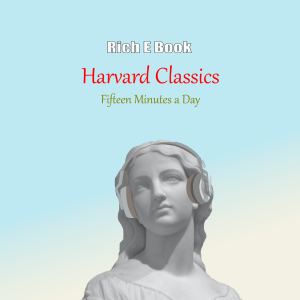
279.5K
Downloads
736
Episodes
Former President of Harvard University Charles W. Eliot wrote in his introduction to the Harvard Classics, "In my opinion, a five-foot shelf would hold books enough to give a liberal education to any one who would read them with devotion, even if he could spare but fifteen minutes a day for reading." Here you are, you can easily listen to his entire 15-minutes-a-day study guide while commuting to and from work (most of us spend far more than 15 minutes a day commuting each day), doing mundane work in the office, washing dishes at home, or doing most of the things day in and day out. It is so easy, so entertaining, and so educational that they can be listened to again and again, until they permeate into our own thinking and into our characters. Perhaps, in one year's time, you will become someone you barely recognize, all for the better. Who knows?
-- Rich E Book
Former President of Harvard University Charles W. Eliot wrote in his introduction to the Harvard Classics, "In my opinion, a five-foot shelf would hold books enough to give a liberal education to any one who would read them with devotion, even if he could spare but fifteen minutes a day for reading." Here you are, you can easily listen to his entire 15-minutes-a-day study guide while commuting to and from work (most of us spend far more than 15 minutes a day commuting each day), doing mundane work in the office, washing dishes at home, or doing most of the things day in and day out. It is so easy, so entertaining, and so educational that they can be listened to again and again, until they permeate into our own thinking and into our characters. Perhaps, in one year's time, you will become someone you barely recognize, all for the better. Who knows?
-- Rich E Book
Episodes

Friday Sep 17, 2021
Introductory Note: John Greenleaf Whittier
Friday Sep 17, 2021
Friday Sep 17, 2021
Introductory note on John Greenleaf Whittier (The Ridpath's Library of Universal Literature)

Friday Sep 17, 2021
Poems, by John Greenleaf Whittier
Friday Sep 17, 2021
Friday Sep 17, 2021
For of all sad words of tongue or pen, the saddest are these: 'It might have been.'" On this theme Whittier based the story of a fair farmer girl and a rich judge. (Volume 42, Harvard Classics)
Whittier died Sept. 17, 1892.

Thursday Sep 16, 2021
Introductory Note: William Harrison
Thursday Sep 16, 2021
Thursday Sep 16, 2021
Introductory note on William Harrison (Volume 35, Harvard Classics)

Thursday Sep 16, 2021
Holinshed’s Chronicles (Ch. XVII), by William Harrison
Thursday Sep 16, 2021
Thursday Sep 16, 2021
"Such felons as stand mute [do not confess] are pressed to death by huge weights laid upon a board that lieth over their breast and a sharp stone under their backs." Old English punishments, recorded by Holinshed, make startling reading. (Volume 35, Harvard Classics)

Wednesday Sep 15, 2021
Introductory Note: George Washington
Wednesday Sep 15, 2021
Wednesday Sep 15, 2021
Introductory note on George Washington (The Ridpath's Library of Universal Literature)

Wednesday Sep 15, 2021
Washington’s Farewell Address, by George Washington
Wednesday Sep 15, 2021
Wednesday Sep 15, 2021
George Washington retired to private life in 1796, entrusting "the preservation of the Union" to the "love of liberty." His last appeal is a vital message to American citizens, as pertinent today as when he penned it. (Volume 43, Harvard Classics)
George Washington published "Farewell Address," Sept. 15, 1796.

Tuesday Sep 14, 2021
Introductory Note: Dante Alighieri
Tuesday Sep 14, 2021
Tuesday Sep 14, 2021
Introductory note on Dante Alighieri (Volume 20, Harvard Classics)

Tuesday Sep 14, 2021
The Divine Comedy (Inferno XXIV), by Dante Alighieri
Tuesday Sep 14, 2021
Tuesday Sep 14, 2021
Dante, having journeyed through Hell and Purgatory, comes at last to St. Peter on his throne. St. Peter calls for the aid of St. James and St. John before passing final judgment on Dante's righteousness. (Volume 20, Harvard Classics)
Dante died Sept. 14, 1321.

Monday Sep 13, 2021
Introductory Note: John Bunyan
Monday Sep 13, 2021
Monday Sep 13, 2021
Introductory note on John Bunyan (Volume 15, Harvard Classics)

Monday Sep 13, 2021
The Pilgrim’s Progress, by John Bunyan
Monday Sep 13, 2021
Monday Sep 13, 2021
From cockfighting, bear baiting, and like sports, the wife of John Bunyan converted him to a life of humility and reverence. While imprisoned for preaching, he used his idle time in writing a fantastic story of a soul's salvation -- probably the most famous allegory ever written. (Volume 15, Harvard Classics)
John Bunyan liberated and pardoned, Sept. 13, 1672.
